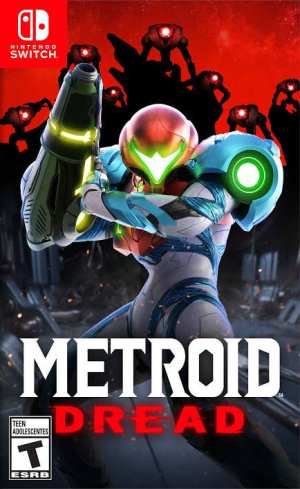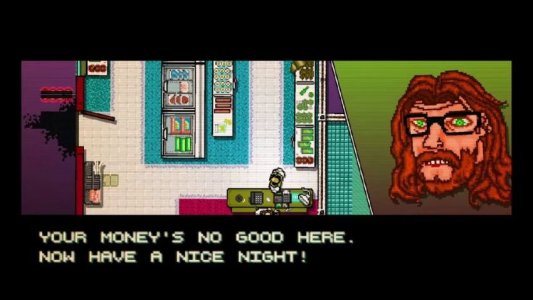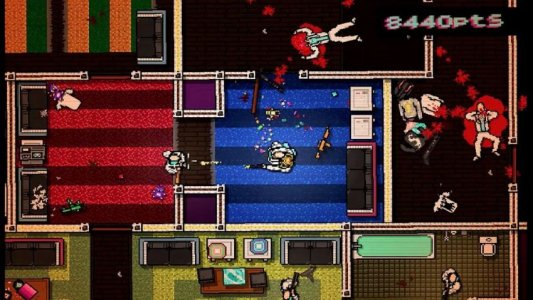You are using an out of date browser. It may not display this or other websites correctly.
You should upgrade or use an alternative browser.
You should upgrade or use an alternative browser.
The 2025 Desert Island Video Game Draft
- Thread starter Capt. Factorial
- Start date
PaRappa The Rapper (1997)
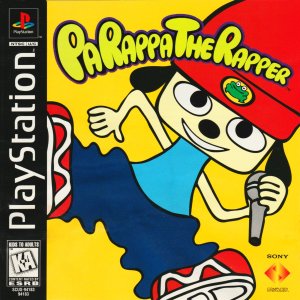

- Developer: NanaOn-Sha
- Publisher: Sony Computer Entertainment
- Producer: Masaya Matsuura
- Lead Designer: Rodney Alan Greenblat
- Programmers: NanaOn-Sha
- Composer: Masaya Matsuura
Last edited:
Löwenherz
Starter
Ebert's argument is commonly interpreted as him being casually dismissive of video games, but the reason he's still referenced years later, is because his criticism was incisive and salient. Straw-manning his argument leaves us all the more foolish.
What Ebert originally said, was that games will become art once they abandon things that make them games, the interactive elements. At that point they become cinema. He wrote this in various posts between 2006 and 2012.
Ebert presents a definition of art that is focused around the artistic vision of the creator. The argument is that anywhere there is agency, where the artist is letting the player inject themselves into the work, it is by definition not the artist's vision. Thus, video games are by principal, not art.
You and I can pick a different definition of art, base it on aesthetics or "cultural value" or some other thing, [for what it's worth, Kojima basically agreed with Ebert's definition](https://www.eurogamer.net/news240106kojimaart) But even if we plant our flag on another hill, his hill remains unconquered.
The question is not whether you can have art in a game, but whether the game itself adds anything to the art. Do the non-cinematic parts of the game have artistic vision? Looking at the list of games on our collective islands, I think that some are trying, but there's no definitive rebuttal since Ebert published. There's a *feeling* that there is an art form, but not enough evidence to prove it. I have no idea where things will be in another 15 years, but I'm hopeful that there will continue to be progress. It's good to try to do hard things, and I think Ebert presents a worthy goal.
The counterpunch that Ebert threw, also remains relevant "Why do gamers want video games to be considered "Art"?" There are lots of things people spend a lot of time on that aren't "Art", that aren't stigmatized.
I sometimes find myself wondering whether being a sports fan is a worthwhile use of my treasure and attention. The strongest justification I can come up with is that being a sports fan puts me in a common interest group with lots of types of people I wouldn't normally interact with in daily life. In the world where it's easier than ever live in a curated bubble, this seems like an important experience to seek out.
Maybe there's a value in noticing that whether we play our video games on a deserted island, a spare office in the suburbs, a palatial estate, or in a parent's basement, we all have something in common. Maybe that's enough to justify the time spent. And maybe even if that's not convincing, we can agree to not stigmatize people for how they spend their free time.
Wow, I was rather dismissive of Ebert’s opinion on this when I thought it was simply narrow-minded and lacked foresight being confined to an era when video game stories were glorified Saturday Morning cartoons.
But what you just described is way, way worse.
The interactivity is what makes it not art? That artistic intent not only matters, but is the only thing that matters? Games will become art when they stop being games and become movies?
No strawman needed; That is not a good faith argument. That is a man desperately protecting his beloved artform from an up-and-coming artform he correctly feared would usurp it.
Let’s get this out of the way first: Every form of human expression is art. When I sing badly in the shower, when my pre-schooler scribbles what she claims is a unicorn on scratch paper with crayons, when a kid pisses his name in the snow. It’s all art. If prehistoric cave drawings can be described as early art, then everything is fair game. My goal is not to diminish art, but to expand, enrich, enable, and embolden all possible forms. It doesn’t matter what medium is used; what matters is the art’s ability to evoke emotion, elevate discussion, and inspire thought.
Basquiat’s entire mission statement was defiantly pushing non-art into high art spaces and demanding it be given authenticity. What would I think of a critic who dismissed Basquiat claiming street graffiti would never be true “art” until it started to look like the Mona Lisa?
So let’s all stop with this nonsense argument. This is not a question of defining terms; it’s a question of assigning value. The only way to interpret Ebert’s critique is to say video games are incapable of evoking, inspiring, and elevating, which inherently makes them less valuable. Art has value; everything else is a diversion, distraction, or really, a waste of time.
I know this to be emphatically untrue.
But these derisive and condescending arguments matter. They matter in convincing people the form in which you choose to express yourself matters more than the message you express. It matters in attempting to invalidate the very real connections and experiences people have with an artform not on the pre-approved list. And it matters in convincing creators they need to chase artificial benchmarks to achieve the all important authenticity.
How many games started trying to promote themselves as “cinematic” in an attempt to be taken seriously? How many games spent valuable and finite resources crafting cut scenes and quick-time events that could have gone toward game mechanics and world-building? How many games broke the bank on casting established Hollywood actors and motion capturing their likeness, while grinding their artists with crunch?
And I reject his patronizing and condescending “why do yo even need to be called art? There are lots of things that people spend their time on that aren’t “Art.” He might as well have patted me on the head and called me sport. If it’s unimportant, why did he feel the need to make the distinction?
It’s just a retread of the old hierarchical high art, low art, no art dynamic and frankly is quite tired and stodgy,
Interactivity and immersion is not a barrier to video games being seen as art. It is their greatest strength and the one component they have above all other artforms. There is an exhibit in LA right now attempt to do just that, and no one is dismissing them as “not art” as a result.
I respected Ebert’s film opinions, even when I disagreed with them. But here, he was purely wrong.
Would dismiss Marina Abramović's out of hand apparently. Ebert deserves his place as one of America's greatest film critics but hardly infallible.Wow, I was rather dismissive of Ebert’s opinion on this when I thought it was simply narrow-minded and lacked foresight being confined to an era when video game stories were glorified Saturday Morning cartoons.
But what you just described is way, way worse.
The interactivity is what makes it not art? That artistic intent not only matters, but is the only thing that matters? Games will become art when they stop being games and become movies?
No strawman needed; That is not a good faith argument. That is a man desperately protecting his beloved artform from an up-and-coming artform he correctly feared would usurp it.
Let’s get this out of the way first: Every form of human expression is art. When I sing badly in the shower, when my pre-schooler scribbles what she claims is a unicorn on scratch paper with crayons, when a kid pisses his name in the snow. It’s all art. If prehistoric cave drawings can be described as early art, then everything is fair game. My goal is not to diminish art, but to expand, enrich, enable, and embolden all possible forms. It doesn’t matter what medium is used; what matters is the art’s ability to evoke emotion, elevate discussion, and inspire thought.
Basquiat’s entire mission statement was defiantly pushing non-art into high art spaces and demanding it be given authenticity. What would I think of a critic who dismissed Basquiat claiming street graffiti would never be true “art” until it started to look like the Mona Lisa?
So let’s all stop with this nonsense argument. This is not a question of defining terms; it’s a question of assigning value. The only way to interpret Ebert’s critique is to say video games are incapable of evoking, inspiring, and elevating, which inherently makes them less valuable. Art has value; everything else is a diversion, distraction, or really, a waste of time.
I know this to be emphatically untrue.
But these derisive and condescending arguments matter. They matter in convincing people the form in which you choose to express yourself matters more than the message you express. It matters in attempting to invalidate the very real connections and experiences people have with an artform not on the pre-approved list. And it matters in convincing creators they need to chase artificial benchmarks to achieve the all important authenticity.
How many games started trying to promote themselves as “cinematic” in an attempt to be taken seriously? How many games spent valuable and finite resources crafting cut scenes and quick-time events that could have gone toward game mechanics and world-building? How many games broke the bank on casting established Hollywood actors and motion capturing their likeness, while grinding their artists with crunch?
And I reject his patronizing and condescending “why do yo even need to be called art? There are lots of things that people spend their time on that aren’t “Art.” He might as well have patted me on the head and called me sport. If it’s unimportant, why did he feel the need to make the distinction?
It’s just a retread of the old hierarchical high art, low art, no art dynamic
This was on my list and I'm glad you picked it cause I probably wasn't going to. And yes, IYKYK for sure.
Kick, punch.
Löwenherz
Starter
With the 105th pick in the 2025 Desert Island Video Game Draft, I select:
Control (2019)

Developer: Remedy Entertainment
Publisher: 505 Games
Game Director: Mikael Kasurinen
Musical Score: Petri Alanko & Martin Stig Andersen
Genre(s): Action-Adventure; Third-Person Shooter
Platform: PC
It's interesting to select this particular game while a decades-old debate has sprung up in this thread regarding the artistic merit of video games. Honestly, Control is probably not the best ambassador for any kind of "Video Games as Art" discourse, as it happens to be a game that borrows mightily from the language of cinema, the language of television, and the language of the New Weird. The lattermost of those influences is a literary movement focused primarily on how the strange intrudes upon the mundane. Jeff VanderMeer's Annihilation is among the best of the New Weird's output, and the influence of Area X is felt all over Control's similarly shape-shifting Oldest House.
Elsewhere, the player will encounter cosmic horror parallel to the mind of H.P. Lovecraft, bits of the brutalist sterility of Kubrick's 2001: A Space Odyssey, the paranoid dream logic of Christopher Nolan's Inception, and the paranormal activity of Chris Carter's The X-Files. Apple TV's Severance could itself be called an influence on Remedy's Control, but for the fact that Severance came after, and Ben Stiller has claimed no relationship to the game. That said, if it's a show that does it for you (as it does for me), and you have yet to play Control, I would... heh... remedy that as soon as possible.
Now for the game itself: visually, it's as striking as they come. It has clear command of its art direction and the aesthetic principles that undergird it. Brutalism is the key design philosophy here, and it is compelling to witness how Control contorts its brutalist design to accommodate the "Altered World Events" that occur within the Oldest House. The House itself is not a static game space; it's a TARDIS of sorts, in that its interior defies the logic that its exterior suggests, and its constructed in the style of a Metroidvania, in that its map is rather large and loops back on itself in a number of clever non-linear ways as the player unlocks new opportunities to explore previously closed-off areas. Those opportunities often come in the ability to wield strange and mysterious phenomena.
Nominally, Control is a third-person "shooter" in which the player controls Jesse Faden, the newly-designated Director of the Federal Bureau of Control. Remedy have never been known for the depth or complexity of their gameplay systems. Interacting with their game worlds is sometimes stale and repetitive, and while Control hardly feels gloriously good to play, it does offer the power fantasy of being a telekinetic virtuoso, flinging all manner of destructible objects with crunchy, weighty satisfaction. That much never really gets old.
But, as a player, what you're here for is the Oldest House. You're here to explore this inexplicable place. You're here for its vibe, for its unknowability. It is best not to try to describe the events that lead Jesse to the Oldest House, and its best not to try to explain what the House is, or what the enemies contained within it are supposed to be. It's best for the player to work out for themselves what weirdness is occurring in this most liminal of spaces. In other words, it's a game that's experienced, and while not every idea here is original, if you've ever wanted to truly live inside something akin to an X-Files episode or one of the five dream levels of Inception or Annihilation's Area X, I'd give Control your best shot.





I can’t like your post again, so I’ll do this to say I loved it.
Padrino
All-Star
With the 112th pick in the 2025 Desert Island Video Game Draft, I select:
Illusion of Gaia (1994)

Developer: Quintet
Publisher: Nintendo
Game Director: Masaya Hashimoto
Musical Score: Yasuhiro Kawasaki
Genre(s): Action RPG
Platform: Super Nintendo Entertainment System
This was the very first "role-playing game" I ever owned. I was maybe eight or nine years old, and my dad bought it for me at a used video game store because he thought the name sounded cool. I did not even know what an RPG was at the time, and Illusion of Gaia was among the more unusual RPGs of its era. It was developed by Quintet, who actually created a series of three RPGs in the early- to mid-90s that were considered a "spiritual trio", or unofficial trilogy, and Gaia was the middle child of these releases. I played the other two as an adult gamer, and they are each incredibly strong SNES RPGs (and the third probably eclipses Gaia as a game overall). That said, this one holds my heart. Much like A Link to the Past, this game genuinely invited in me a desire to explore.
At Illusion of Gaia's outset, Will, the player character, finds himself inside a "Dark Space" populated by a single being referred to as "Gaia". The being informs Will that a comet is approaching Earth, bringing all manner of misfortune with it. It is Will's duty to stop it. As with many JRPGs, our hero is an adolescent in age, and his young friends are his aid as he ventures into the larger world, filled as it is with danger and opportunities to overcome fear, anxiety, rage, and romantic impulses. What makes Illusion of Gaia so wonderful is its wanderlust; the game is set in a fantastical version of Earth that mirrors many actual ancient civilizations, Wonders of the World, and geographical myths from our own planet's history.
As the characters traverse the globe, they find themselves in ancient Incan ruins, the Hanging Gardens of Babylon, the famed geoglyphs of Nazca, the grand temples of Angkor Wat, the Great Wall of China, the Egyptian pyramids, and the mythical Tower of Babel. I was so struck by the way these locations were rendered in all of their 16-bit glory, and it would not be an exaggeration to say that Illusion of Gaia is responsible for my love of history, mythology, and travel. After playing this game, I dove into kid-friendly texts on ancient cultures, watched movies that brought mythology to life, and begged my parents to take me to the Great Wall of China (I still haven't been, though it remains very high up on my travel to-do list).
Apart from the extraordinary diversity of its setting, Illusion of Gaia had a fairly novel approach to the RPG tradition of "leveling up". Will fights only with a flute (!!), and once he uses his flute to clear an area of enemies, he is granted a red jewel that permanently increases his attack power, defensive ability, or health points. The only way to earn those "level ups" is to defeat every single enemy in an area, and the game occasionally made good use of its maps to hide the route to some of those enemies. At specific points in the game, Will is also gifted power by Gaia to transform into the dark knight Freedan, which grants Will use of a proper sword, and he's eventually gifted the power to transform into the simply-named Shadow, as well. These transformations offered intriguing gameplay opportunities, certainly, but they also possessed great thematic resonance regarding the personas we carry, and how difficult it is to know oneself in a world that's ever-changing.
What a special game this was for eight year old me. I had no idea that it would become a cult favorite, talked about with reverance by those in the know, but largely consigned to the dust bin of history while other JRPGs of the era remain atop all of the "Best of" lists, games such as Chrono Trigger, selected by @Löwenherz in this draft, or Secret of Mana, selected by @SLAB in this draft, or any of the SNES Final Fantasy games. But if you fancy yourself a retro gamer at all, don't sleep on any of Quintet's unofficial SNES trilogy, Illusion of Gaia, in particular.



Illusion of Gaia (1994)

Developer: Quintet
Publisher: Nintendo
Game Director: Masaya Hashimoto
Musical Score: Yasuhiro Kawasaki
Genre(s): Action RPG
Platform: Super Nintendo Entertainment System
This was the very first "role-playing game" I ever owned. I was maybe eight or nine years old, and my dad bought it for me at a used video game store because he thought the name sounded cool. I did not even know what an RPG was at the time, and Illusion of Gaia was among the more unusual RPGs of its era. It was developed by Quintet, who actually created a series of three RPGs in the early- to mid-90s that were considered a "spiritual trio", or unofficial trilogy, and Gaia was the middle child of these releases. I played the other two as an adult gamer, and they are each incredibly strong SNES RPGs (and the third probably eclipses Gaia as a game overall). That said, this one holds my heart. Much like A Link to the Past, this game genuinely invited in me a desire to explore.
At Illusion of Gaia's outset, Will, the player character, finds himself inside a "Dark Space" populated by a single being referred to as "Gaia". The being informs Will that a comet is approaching Earth, bringing all manner of misfortune with it. It is Will's duty to stop it. As with many JRPGs, our hero is an adolescent in age, and his young friends are his aid as he ventures into the larger world, filled as it is with danger and opportunities to overcome fear, anxiety, rage, and romantic impulses. What makes Illusion of Gaia so wonderful is its wanderlust; the game is set in a fantastical version of Earth that mirrors many actual ancient civilizations, Wonders of the World, and geographical myths from our own planet's history.
As the characters traverse the globe, they find themselves in ancient Incan ruins, the Hanging Gardens of Babylon, the famed geoglyphs of Nazca, the grand temples of Angkor Wat, the Great Wall of China, the Egyptian pyramids, and the mythical Tower of Babel. I was so struck by the way these locations were rendered in all of their 16-bit glory, and it would not be an exaggeration to say that Illusion of Gaia is responsible for my love of history, mythology, and travel. After playing this game, I dove into kid-friendly texts on ancient cultures, watched movies that brought mythology to life, and begged my parents to take me to the Great Wall of China (I still haven't been, though it remains very high up on my travel to-do list).
Apart from the extraordinary diversity of its setting, Illusion of Gaia had a fairly novel approach to the RPG tradition of "leveling up". Will fights only with a flute (!!), and once he uses his flute to clear an area of enemies, he is granted a red jewel that permanently increases his attack power, defensive ability, or health points. The only way to earn those "level ups" is to defeat every single enemy in an area, and the game occasionally made good use of its maps to hide the route to some of those enemies. At specific points in the game, Will is also gifted power by Gaia to transform into the dark knight Freedan, which grants Will use of a proper sword, and he's eventually gifted the power to transform into the simply-named Shadow, as well. These transformations offered intriguing gameplay opportunities, certainly, but they also possessed great thematic resonance regarding the personas we carry, and how difficult it is to know oneself in a world that's ever-changing.
What a special game this was for eight year old me. I had no idea that it would become a cult favorite, talked about with reverance by those in the know, but largely consigned to the dust bin of history while other JRPGs of the era remain atop all of the "Best of" lists, games such as Chrono Trigger, selected by @Löwenherz in this draft, or Secret of Mana, selected by @SLAB in this draft, or any of the SNES Final Fantasy games. But if you fancy yourself a retro gamer at all, don't sleep on any of Quintet's unofficial SNES trilogy, Illusion of Gaia, in particular.



Löwenherz
Starter
With my 9th pick, I’m going to select a game that was the original entry for a franchise that’s already had four games selected - and I’m not saying it’s the best of them all, I’m saying it’s the only one I’ve played:
Final Fantasy (1990) - NES

Warning: Don’t watch this whole video. It’s four hours long! I just wanted to give you an idea of the game play.
Final Fantasy is likely the longest game I’ve ever completed. The game has a giant overhead map - in fact, the gamemakers went so far as to include a huge foldout paper world map and dungeon map with the game. I don’t know what we would have done without it. The play itself is turn-based combat, which wasn’t really a familiar thing back in the day for video games, though it did make things feel a lot more like D&D.
I mean, looking back on it, it’s basically D&D. Also, because of the turn-based combat, it’s one of those games that were a lot more fun to play with friends - aside from sports genres, multiplayer stuff was actually pretty rare for the NES so a lot of video game time was spent watching your friends play for half an hour, and then grabbing the controller when somebody died so you could play a bit yourself. Final Fantasy allowed you to select (and name!) four characters - so up to four people could play cooperatively without anybody caring too much about who had the controller.
It’s funny, I haven’t touched this game in over 30 years but I turn on that video and it all comes back to me - including the music. Good times, good times!
What an amazing example of a developer going for broke, ignoring established conventions, and just creating the game they wanted because there was no tomorrow for them - and it launching one of the most revered, popular, and long-running franchises in gaming.
It’s easy to lose sight of just how massive this game was in scope for the time. Four elemental fiend bosses ruling their own corrupted continent, bookend encounters in the Temple of Fiends to take out Garland in the intro and Chaos for the finale*, the Castle of Ordeal optional side quest, a “save the princess” introduction quest specifically to troll the established untouchable NES RPG of the era and king of Japan, a team of four heroes of your choosing taking on scores of enemies at a time.
Even then I couldn’t stand random encounters, but I tolerated them more then because I understood there weren’t great alternatives.
This is the game my buddy and I used the enemy printout on the back of the map the game provided to create our own proto-Pokemon game. Truly epic.
Can I confess something? I have never played a FF game.
SLAB
Hall of Famer
Can I confess something? I have never played a FF game.
6 is GOAT.
6 is S-tier, for sure, but I have a soft spot in my heart for 4, since that's the one I played first.6 is GOAT.
I'd always heard that, in the Japanese version, you can revive Palom and Porom. Is that true?
Last edited:
macadocious
Starter
I was in SF over the weekend and got breakfast at a little cafe near china town and there was a couple at the other table playing a Final Fantasy card game that I mistook initially for Magic the Gathering.
Can I confess something? I have never played a FF game.
There's no time like the present!
Final Fantasy I from the NES era, Final Fantasy VI (originally called Final Fantasy III in North America) from the SNES era, Final Fantasy VII and IX from the PS1 era, and Final Fantasy X from the PS2 era have all been drafted so far and since each game has it's own characters, story, unique battle/spell mechanics and very little overlap with the others beside a core design philosophy I think that any of them would be a good starting point depending on which theme and visual style most appeals to you. Final Fantasy X is the first one where Nobuo Uematsu did not compose the full soundtrack himself but
Last edited:
macadocious
Starter
I said it early in here, but it bears repeating, its cost me 1/2 a semester of college. I had to repeat two classes. I would stay up all night playing that dam game. I still never beat it! I could not get past the last boss.6 is GOAT.
:: double-checks draft board ::There's no time like the present!
Final Fantasy I from the NES era, Final Fantasy VI (originally called Final Fantasy III in North America) from the SNES era, Final Fantasy VII and IX from the PS1 era, and Final Fantasy X from the PS2 era have all been drafted so far and since each game has it's own characters, story, unique battle/spell mechanics and very little overlap with the others beside a core design philosophy I think that any of them would be a good starting point depending on which theme and visual style most appeals to you. Final Fantasy X is the first one where Nobuo Uematsu did not compose the full soundtrack himself but it does include a number of his themes including perhaps my favorite theme out of all of them.
Aw, damn! Let me go edit my last post real quick!
:: double-checks draft board ::
Aw, damn! Let me go edit my last post real quick!
An easy mistake to make. Those damned roman numerals can play tricks on your eyes.
I feel so dirty as a mod in this thread but I'm not participating (I may give my list of 15 undrafted at the end) so I guess I shouldn't feel guilty.
SLAB
Hall of Famer
I said it early in here, but it bears repeating, its cost me 1/2 a semester of college. I had to repeat two classes. I would stay up all night playing that dam game. I still never beat it! I could not get past the last boss.
Gotta farm the dinosaurs in the Dino Forest to get those extra level buffs before the final tower!
I won't rule it out. the JRPG series I have the most experience with has so far been untouched. But I strongly prefer western RPG games. I did have a deep D&D spell from 3rd to 6th grades and played a lot of C64 and Apple games. But sort of checked out by the time I got to highschool.There's no time like the present!
Final Fantasy I from the NES era, Final Fantasy VI (originally called Final Fantasy III in North America) from the SNES era, Final Fantasy VII and IX from the PS1 era, and Final Fantasy X from the PS2 era have all been drafted so far and since each game has it's own characters, story, unique battle/spell mechanics and very little overlap with the others beside a core design philosophy I think that any of them would be a good starting point depending on which theme and visual style most appeals to you. Final Fantasy X is the first one where Nobuo Uematsu did not compose the full soundtrack himself butit does include a number of his themesthe bulk of the soundtrack is his work including perhaps my favorite theme out of all of them.
Oddly I had a Sega Saturn (still do) and Sega CD and didn't touch a lot of the Sega stuff despite those basically being the only games worth playing on those platforms lol
You aren't the only one.Can I confess something? I have never played a FF game.
whitechocolate
Bench
Hotline Miami is a slickly designed game with great style, a fantastic soundtrack, and fun action gameplay. It's a top down action game, where the character works his way through floors of different buildings, killing every body inside. The main character dies right away when hit, so all the player's decisions have to be quick. The player shoots, hits, stabs, slams doors into, and throws stuff at enemies. Chaining together kills for combos ties the gameplay together. Each floor is a puzzle where the player has to figure out how to get the highest score. There are masks to wear that give the player an extra ability. Choosing the best mask for each floor is vital for maximizing score. The game rewards planning, fast reactions, and on the fly decision making. The music and art both work great cohesively with each other and the gameplay. The music is electronic with lots of synth wave, from artists such as Perturbator and M.O.O.N. I even bought the Sun Araw record that has the track "Horse Steppin" on it. The art style is very vibrant with a psychedelic twist, which fits the mysterious nature of the story too. The heavily pixelated hand drawn style of masks and faces during dialogue portions are very distinct, memorable, and push the artisitic vision of the game forward.
Last edited:
I didn't finish Elden Ring (and quite possibly this is why) but everyone talked about how hard it was that I basically farmed the crap out of the early game so I was OP'd for all the boss fights. Then I tried to basically go for every sub-boss before advancing through the lands.Gotta farm the dinosaurs in the Dino Forest to get those extra level buffs before the final tower!
I think I mentioned early on that pre-internet was the best time for gaming. Hell I even had the goddamned dogs spoiled for me by the internet back in the day.
Löwenherz
Starter
Let’s make this one for everlasting peace!
Mega Man X (SNES) - 1993
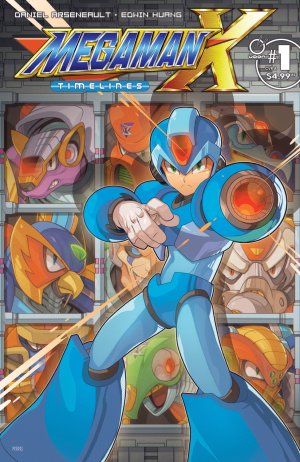
Yes, I realize that picture is from a seemingly tangential manga-inspired comic book I’ve never read and know nothing about. But it presents just the right amount of 90s edge for which the X series is famous that simply is not conveyed by the rosy-cheeked US box cover art:
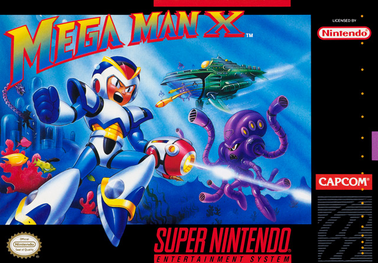
I’m sure it’s hard to believe given I’ve waited this long to pick an entry in the series, but there is no other gaming franchise that means more to me than Mega Man. My favorite game on the NES is a Mega Man game I drafted last time; I tracked down, played and beat all 10 entries on the NES and SNES as a kid; a retro-revival classic Mega Man title on the PS3 brought me back to the hobby; and I’ve designed my own levels and robot masters / mavericks for decades - if I could get a computer to work the program, I’d be an active member of the fan-community and regular entrant in MAGMML (as it is, I’m just a frequent spectator).
There are no less than 5 Mega Man games I’d be open to take here, but I’m going with the first Mega Man X because I think it might be the best mix of high-octane fun with X’s wall kicks and dash movement without game breaking power-ups with absurd level boosts and reasonable challenge with the option to choose either speed runs or buster-only perfect runs. Plus I dig the more gritty cyberpunk-adjacent aesthetic. If the classic series was Astro Boy, X was more like Neon Genesis Evangelion
… well, at least closer to Cowboy Bebop.
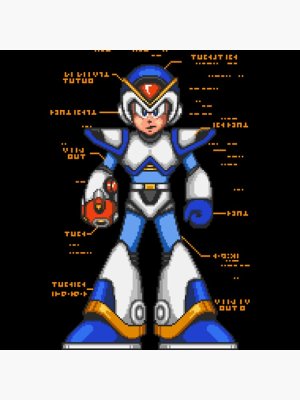
Just look at that scowl. X would never have spared Wily like his Boy Scout predecessor.
In truth, which of my favorites from the series I choose largely depends on my mood, whether I’m feeling extra nostalgic for a solid long haul challenge with some extra movement options, a more traditional no frills but full vibes romp, a retro-inspired super challenge, or an extra technical precision speedrunner’s paradise. Ask me in a week and I might give you a different answer, but for now, I’m going with the high-speed, sprawling, cyber-battle set to a rocking guitar synth.
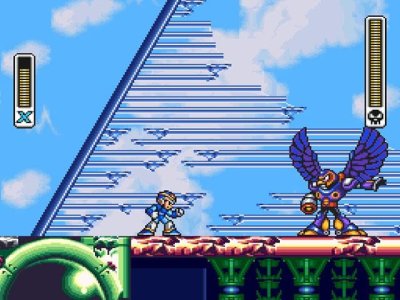
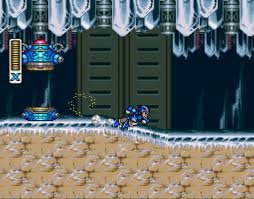
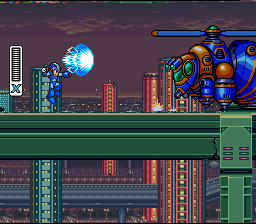
I love how some of the Mavericks have unique responses when being hit by their weaknesses, like Armored Armadillo losing his armor. Or that Boomer Kuwanger’s Boomerang Cutter can sever Launch Octopus’ tentacles and Flame Mammoth’s trunk, making the fight significantly easier even though that’s not their weakness. Or that Spark Mandrill and Flame Mammoth’s stages are different if you defeat Storm Eagle and Chill Penguin first, respectively. Or that every Maverick weapon has a special secondary charged effect including making X invincible when Sting Chameleon’s weapon is fully charged. And I love that I just named all 8 Mavericks in this paragraph.
Bottom line, this is a super polished mega man experience from the iconic highway intro level to the final battle with Sigma that infuses a theme of growth and overcoming adversity baked into the gameplay.
And I expressed just how 90s cool all of this was without once mentioning Zero and Vile.
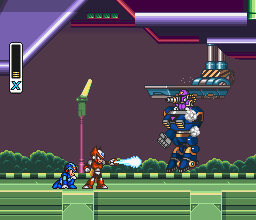
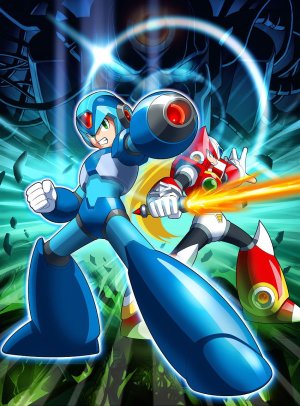
Mega Man X (SNES) - 1993

Yes, I realize that picture is from a seemingly tangential manga-inspired comic book I’ve never read and know nothing about. But it presents just the right amount of 90s edge for which the X series is famous that simply is not conveyed by the rosy-cheeked US box cover art:

I’m sure it’s hard to believe given I’ve waited this long to pick an entry in the series, but there is no other gaming franchise that means more to me than Mega Man. My favorite game on the NES is a Mega Man game I drafted last time; I tracked down, played and beat all 10 entries on the NES and SNES as a kid; a retro-revival classic Mega Man title on the PS3 brought me back to the hobby; and I’ve designed my own levels and robot masters / mavericks for decades - if I could get a computer to work the program, I’d be an active member of the fan-community and regular entrant in MAGMML (as it is, I’m just a frequent spectator).
There are no less than 5 Mega Man games I’d be open to take here, but I’m going with the first Mega Man X because I think it might be the best mix of high-octane fun with X’s wall kicks and dash movement without game breaking power-ups with absurd level boosts and reasonable challenge with the option to choose either speed runs or buster-only perfect runs. Plus I dig the more gritty cyberpunk-adjacent aesthetic. If the classic series was Astro Boy, X was more like Neon Genesis Evangelion
… well, at least closer to Cowboy Bebop.

Just look at that scowl. X would never have spared Wily like his Boy Scout predecessor.
In truth, which of my favorites from the series I choose largely depends on my mood, whether I’m feeling extra nostalgic for a solid long haul challenge with some extra movement options, a more traditional no frills but full vibes romp, a retro-inspired super challenge, or an extra technical precision speedrunner’s paradise. Ask me in a week and I might give you a different answer, but for now, I’m going with the high-speed, sprawling, cyber-battle set to a rocking guitar synth.



I love how some of the Mavericks have unique responses when being hit by their weaknesses, like Armored Armadillo losing his armor. Or that Boomer Kuwanger’s Boomerang Cutter can sever Launch Octopus’ tentacles and Flame Mammoth’s trunk, making the fight significantly easier even though that’s not their weakness. Or that Spark Mandrill and Flame Mammoth’s stages are different if you defeat Storm Eagle and Chill Penguin first, respectively. Or that every Maverick weapon has a special secondary charged effect including making X invincible when Sting Chameleon’s weapon is fully charged. And I love that I just named all 8 Mavericks in this paragraph.
Bottom line, this is a super polished mega man experience from the iconic highway intro level to the final battle with Sigma that infuses a theme of growth and overcoming adversity baked into the gameplay.
And I expressed just how 90s cool all of this was without once mentioning Zero and Vile.


Last edited:
I can't believe it took until the tenth round for a game from that franchise to be picked.

Pocket Tanks Deluxe
Developer: Blitwise Productions
Year: 2009
Platform: iOS
If I'm on an island I need at least one game I can play on the iPhone while I wander around paradise. I can't spend all my days tied to a PC, you know. This is pretty much the only iOS game I've used that has endured over all the years - I don't know that I could count the hours I've spent with this one. If you ever played Scorched Earth from the early 1990's - basically the same thing, but better.
There's no backstory. There's no plot. It's simple, yet you still need to use strategy. The environment is totally destructible. All you are doing is launching weapons at each other, artillery-style. But with 400± weapons to use, you have to know what they do, what order to use them in, and what not to try (because they are pretty pointless, only work in very limited circumstances, or just have some pretty big drawbacks). Some weapons work great under pretty much any circumstances. Some are defensive only. Some only dig holes or bury the opponent with dirt, lava, a rainbows or ice. Some are pretty much pointless (looking at you, Lemon). Some are great, but if you get buried and launch them they will wipe out your points with a quickness. Some weapons are direct fire, some are artillery only, some work best when the opponent is up on a hill, some work best when they are buried, some can bounce around some, some cause bouncy surfaces! Some release little robots that attack. There's no end to the zaniness sometimes.
I typically just play single player against the computer. Crank the difficulty up to 10 with randomized computer opponents, pick your 1/2 of the 20 random weapons offered (scroll through the options and plan ahead for your strategy for that round), and start launching! It's turn-based, so no fast twitch reflexes needed. Mindless fun in short spurts when you want to be distracted.

Here's a little video showing what the gameplay is like.

BlitWise Productions, Creator of Pocket Tanks and DX-Ball
Writing games that are good clean fun... high quality, family approved games that you won't be afraid to show to your non-computer buddies. C64/Amiga style games for the next generation.
classic.blitwise.com
Last edited:
SLAB
Hall of Famer
At this point, during my long extended stay on a deserted island I’m getting sick of video games. I want to learn a tangible skill after I’ve beaten Secret of Mana for the third time.
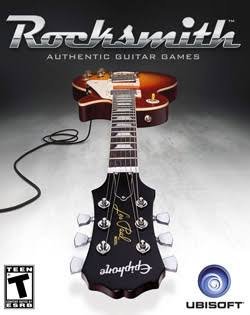
Pick 10: Rocksmith (XB1)
It’s Guitar Hero (almost went with that here) but with a real guitar or bass. You plug your axe into your system, and you’ve got a near endless list of songs to learn.
Before you dive headlong into songs (which it automatically adjusts to your skill level) there’s a pretty in depth tutorial how to actually do the things you need to do.
Once you do (or don’t, who needs tutorials lol) you get to pick from a robust list of songs (a never-ending list if the DLC counts here) and it adjusts to your skill level and you can play and improve as the notes flash in front of you.
I’m a terrible guitar player, it breaks my brain, but have managed to 100% a couple songs on the bass. Sure I could never ever do it without the notes directly in front of me but darn do I feel accomplished when I “beat” a song for the first time. Clicking up that percentage is so rewarding!

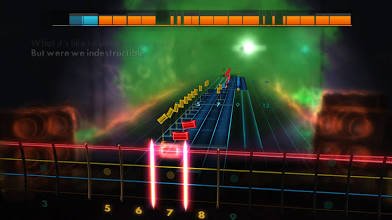

Pick 10: Rocksmith (XB1)
It’s Guitar Hero (almost went with that here) but with a real guitar or bass. You plug your axe into your system, and you’ve got a near endless list of songs to learn.
Before you dive headlong into songs (which it automatically adjusts to your skill level) there’s a pretty in depth tutorial how to actually do the things you need to do.
Once you do (or don’t, who needs tutorials lol) you get to pick from a robust list of songs (a never-ending list if the DLC counts here) and it adjusts to your skill level and you can play and improve as the notes flash in front of you.
I’m a terrible guitar player, it breaks my brain, but have managed to 100% a couple songs on the bass. Sure I could never ever do it without the notes directly in front of me but darn do I feel accomplished when I “beat” a song for the first time. Clicking up that percentage is so rewarding!


whitechocolate
Bench
Nothing personal, but I'm putting Shaq and Kobe on my team. And if you take Shaq, I'm taking Yao Ming. If you take Kobe, I'm taking McGrady.NBA Street Vol 2.
View attachment 13874
Yay basketball. Yay fun. And yay Bobbito Garcia aka Kool Bob Love aka DJ CucumberSlice called the games.
Old comment because I was saving drafts.
Sluggah
All-Star
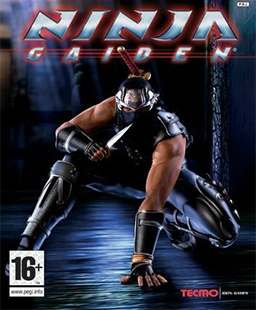
Title: Ninja Gaiden
Format: Xbox
Year of Release: 2004
Developer: Team Ninja
Ninja hack-n-slash enters the 3rd dimension. Another staple for me of going over to a friend’s with the sole goal of grinding through this game. High difficulty and high skill requirements for combat, but it never felt punishing or demoralizing, thanks to how fun and satisfying the carnage felt when you finally put it all together.
A sequel is coming soon and I can’t wait.
macadocious
Starter
I legitimately cannot believe this is still on the board, specifically due to the demographic of this board and the main reason why we all post here, basketball.

Title: NBA Jam
Format: Arcade
Year of Release: 1993
Developer: Midway
The year was 1993, a high school junior and his nerdy yet sports obsessed friends didn't go to parties, didn't date (much), didn't drink, no drugs, so what vice did they have? Gambling and baseball cards! Where did they hand out, the local baseball card shop located in the Bel Air shopping center in Cameron Park. The shop was owned by a guy named Vince. Vince was old. He probably was only in his 40s or 50s, but we thought he was ancient. This was actually my first foray into fantasy sports, we used to have a fantasy baseball league run out of there. The retired postal worker (name is slipping my mind) who would get a sac bee and every day go over to Carls Jr and manually update the points, then post them by midday in the shop, we would go by almost daily to view them during baseball season. While we were there, we would inevitably play videos games to gamble on. The number one on that list was the NBA Jams machine at the front of the store.
SIDE NOTE: Robert Pimnetal, former equipment manager for the Kings use to work at this shop. He was a couple years younger than us. We called him card shop Bobby. Nice kid, ended up moving to the Miami Heat, got a ring there. Haven't seen him in years. Hope he is well.
As for the game. HE'S ON FIRE!!! was uttered on the playground more than maybe any other phrase outside of And 1 over the next decade.
I used to love getting the big head on the players, that was fun. Good times, good times.
BOOM SHAKALA!

Title: NBA Jam
Format: Arcade
Year of Release: 1993
Developer: Midway
The year was 1993, a high school junior and his nerdy yet sports obsessed friends didn't go to parties, didn't date (much), didn't drink, no drugs, so what vice did they have? Gambling and baseball cards! Where did they hand out, the local baseball card shop located in the Bel Air shopping center in Cameron Park. The shop was owned by a guy named Vince. Vince was old. He probably was only in his 40s or 50s, but we thought he was ancient. This was actually my first foray into fantasy sports, we used to have a fantasy baseball league run out of there. The retired postal worker (name is slipping my mind) who would get a sac bee and every day go over to Carls Jr and manually update the points, then post them by midday in the shop, we would go by almost daily to view them during baseball season. While we were there, we would inevitably play videos games to gamble on. The number one on that list was the NBA Jams machine at the front of the store.
SIDE NOTE: Robert Pimnetal, former equipment manager for the Kings use to work at this shop. He was a couple years younger than us. We called him card shop Bobby. Nice kid, ended up moving to the Miami Heat, got a ring there. Haven't seen him in years. Hope he is well.
As for the game. HE'S ON FIRE!!! was uttered on the playground more than maybe any other phrase outside of And 1 over the next decade.
I used to love getting the big head on the players, that was fun. Good times, good times.
BOOM SHAKALA!
Similar threads
- Replies
- 13
- Views
- 962
- Replies
- 17
- Views
- 1K
- Replies
- 15
- Views
- 1K
- Poll
- Replies
- 41
- Views
- 3K
- Replies
- 25
- Views
- 1K

